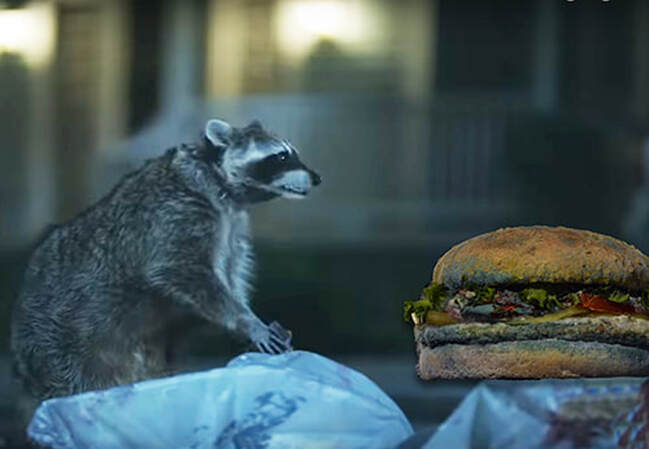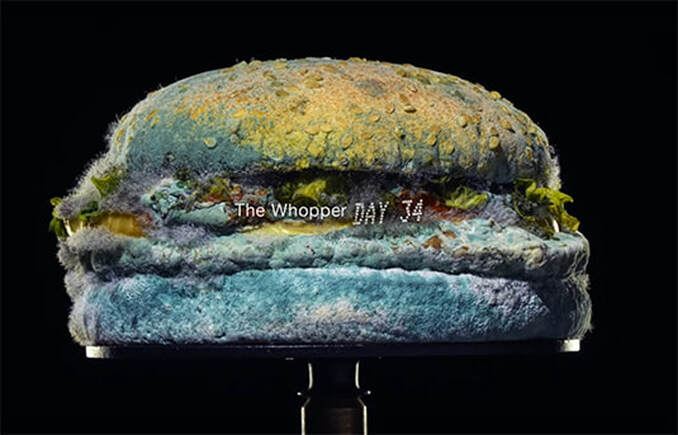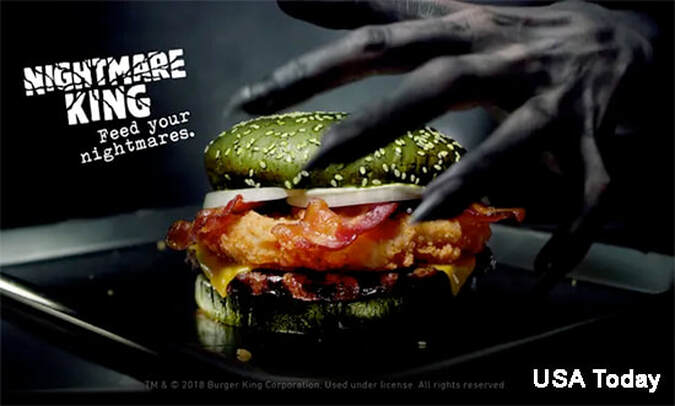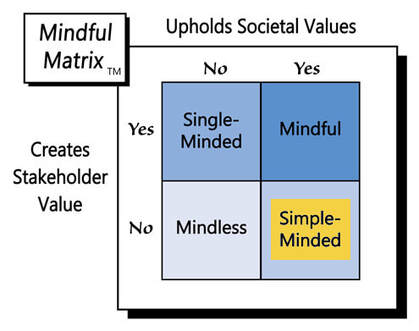Few food companies have the mettle to play with such fire, but one known for flame-broiling and often flagrant marketing does: Burger King. The fast food icon recently launched a “global, integrated advertising campaign showing its iconic Whopper® sandwich covered in mold.”
A video from the company begins with the staging of a very attractive Whopper. Then, against a music bed of “What a difference a day makes,” filming turns to a rapid time lapse and the burger ages abhorrently before our eyes.
First, the lettuce starts to wither. Then the bun sags and mayonnaise melts. Before we can look away, white fuzz flows over the beef patty and a green/blue ‘foam’ appears, making a cross-section closeup look like a storm at sea. Thankfully, the camera pans out, but only to show a bun enveloped in mold with some black substance oozing from the burger’s epicenter.
The visual agony eventually ends as a text overlay briefly appears: “The Whopper DAY 34.” The grotesque burger vanishes into an all-black screen that frames the tagline “THE BEAUTY OF NO ARTIFICIAL PRESERVATIVES,” followed by an all-white Burger King logo.
Most organizations agonize over advertisements, trying to ensure that their products are presented in the most positive light. Those in food industries seem especially attuned to their ads’ optical appeal, and for good reason: Studies have found that visual stimuli such as color, evenness, and shape “exert cognitive top-down influences that can and sometimes do alter assessments of taste and flavor.” In other words, there is truth to the old adage: ‘We eat with our eyes.’
So, why would Burger King flame-broil conventional wisdom by plating a burger that could make the Geico racoons retch?
The main reason stems from the spot’s tagline, “The beauty of no artificial preservatives.” The company wants consumers to realize that it has made a clean-break from past practice and it no longer uses nonorganic life-extenders, at least not in “most European countries and select markets in the United States.” Furthermore, according to Christopher Finazzo, Burger King’s Americas President:
“The Burger King® brand is currently rolling out the Whopper® sandwich with no preservatives, colors, or flavors from artificial sources in the U.S. The product is already available in more than 400 restaurants in the country and will reach all restaurants throughout the year.”
Unfortunately, in terms of touting “real food,” Burger is painfully late to the game. Chipotle, Panera, and a crowd of fast-casual restaurants have been making that claim for a few decades. Even many processed food manufacturers, like General Mills, have kept better pace with consumer desires for healthier food. The company has already removed artificial ingredients from most of its cereals.
So, maybe Burger King needed to do something shocking to grab the attention of a populace likely to overlook or be unimpressed by what is an increasingly common change. The promotion certainly has gained the company free media exposure and gotten marketers like me talking about it.
A similar tact also must have worked, at least somewhat, when the firm unearthed its Halloween-inspired “Nightmare King” in the fall of 2018. Although it never seemed that the green-bun burger was a big seller, it did grab headlines and likely helped keep the restaurant top-of-mind among those who frequent fast food.
It’s also possible that the Moldy Whopper promo resonates with Gen Zs and Millennials, who are used to unconventional advertising and who demand transparency from the brands they buy. These age cohorts might uniquely appreciate the combination of candor and irreverence.
Still, the avant-garde ad campaign takes an extraordinary and nearly unprecedented risk by essentially forgoing the Maslow-level-one appeal of appetizing food. Maybe having “no artificial preservatives” hits a higher tier of the hierarchy, such as safety or self-esteem, but according to the theory, people’s desires will never ascend to those upper levels if their hunger is unsatisfied.
Burger King apparently is banking on viewers remembering the pristine burger that appears at the beginning of the ad for a few seconds, rather than the progressively repulsive Whopper that fills the other forty-five seconds. “Negativity bias,” however, upends that hope: Our brains are “simply built with a greater sensitivity to unpleasant news.” Said another way, there are some things we simply can’t ‘unsee’ and a mold-covered Whopper is probably one of them.
Although few organizations are so daring as to cast their products in a negative light, many do fall into the same general AIDA-defying trap: In an all-out effort to grab attention and retain interest, they sacrifice desire and action. As evidence, recall all the commercials you can from the last Super Bowl, then try to remember the companies responsible for each of them.
Like many other restaurants, Burger King is in an existential battle with all kinds of new competitors, especially those in the fast-casual space. It’s great that the fast food icon has taken steps to make some of its menu items more user-friendly, but those health benefits will never accrue to people who are put off by what they see in the company’s stomach-turning promotion. The new burger may be better for you, but etching the image of a moldy Whopper onto people's minds must be “Simple-Minded Marketing.”
Learn more about the Mindful Matrix and Mindful Meter.
Check out Mindful Marketing Ads and Vote your Mind!





 RSS Feed
RSS Feed